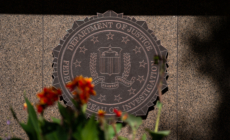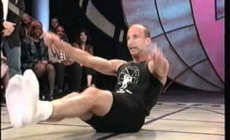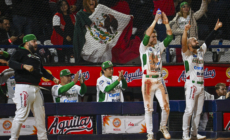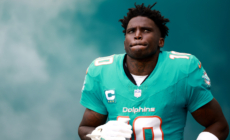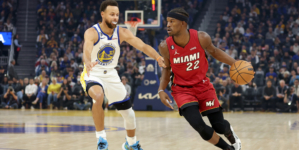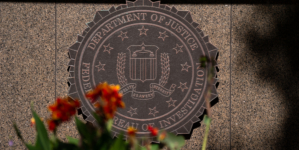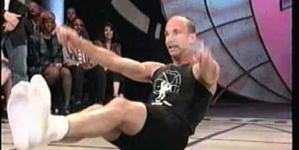-
FBI Agents Association Issues Memo On Trump Admin’s Employee Questionnaire - 39 mins ago
-
Double Dutch Pro Uses Jump Rope in Icy Pond Rescue - 44 mins ago
-
How to Watch Grizzlies vs Bucks, Live Stream NBA, TV Channel - about 1 hour ago
-
OpenAI Unveils New A.I. Agent for Research - about 1 hour ago
-
How to Watch Dominican Republic vs Mexico, Live Stream Caribbean Series, TV Channel - 2 hours ago
-
Here’s the 2025 Grammy Awards Winners List - 2 hours ago
-
Noah Lyles Reignites Feud With Dolphins Star Tyreek Hill After Winning 60M - 2 hours ago
-
Grammys Red Carpet Photos: 2025 Looks - 3 hours ago
-
Blue Jays Could Still Win Pete Alonso Sweepstakes After Recent Reported Mets Offer - 3 hours ago
-
Luka Doncic Breaks Silence on Blockbuster Trade to Lakers - 4 hours ago
Raptors Fans Boo US Anthem in Protest of Donald Trump Tariffs
Toronto Raptors fans are booing, but not their opponents on the court. Instead, they are booing the United States Anthem in protest of President Donald J. Trump’s newly announced, highly controversial tariffs.
US anthem being booed at the Raptors-Clippers game. This has nothing to do with Kawhi Leonard and is more about US imposing 25 per cent tariffs on Canadian exports and the US president musing about taking us over. Canadian anthem being, sung, cheered and lyric ‘free’ emphasized.
— Michael Grange (@michaelgrange) February 2, 2025
More News: Awkward Press Conference Confirms Mavs’ Jason Kidd Wasn’t Told About Luka Doncic Trade
Per sports reporter Michael Grange, “US anthem being booed at the Raptors-Clippers game. This has nothing to do with Kawhi Leonard and is more about the US imposing 25 percent tariffs on Canadian exports and the US president musing about taking us over. Canadian anthem being, sung, cheered and lyric ‘free’ emphasized.”

Tom Szczerbowski/Getty Images
In a rare show of protest during the national anthem, fans in Canada’s lone NBA city booed the U.S. anthem before a Toronto Raptors game, continuing a pattern that began the previous evening at NHL games in Ottawa and Calgary.
The wave of discontent came just hours after U.S. President Donald Trump followed through on his threat to impose steep import tariffs on Canada, further intensifying the already strained relationship between the two nations.
The protest started when 15-year-old Kyra Daniel began singing “The Star-Spangled Banner” ahead of the Raptors’ game against the Los Angeles Clippers. While initially met with cheers, the young singer was soon drowned out by boos that echoed throughout the arena.
The mixed reception continued as the anthem concluded, but the atmosphere shifted dramatically when “O Canada” was played. The crowd erupted in loud applause, with particularly strong cheers for the anthem’s references to freedom and national pride.
This moment of defiance was set against the backdrop of President Trump’s recent economic moves, which included imposing a 25% tariff on imports from Canada and Mexico, as well as a 10% tariff on goods from China.
In addition to taxing energy imports like oil and natural gas, the tariffs are seen as a direct challenge to Canada’s economy.
In response, Canadian Prime Minister Justin Trudeau announced retaliatory tariffs, slapping 25% duties on $20 billion worth of U.S. goods, with plans for even more to follow in the coming weeks.
On a more symbolic level, provincial leaders, like Ontario Premier Doug Ford, took further action, halting the sale of American liquor in the province.
The backlash against the tariffs has sparked similar reactions at sporting events across Canada.
On Saturday night, fans in Kanata, Ontario, booed “The Star-Spangled Banner” ahead of the Ottawa Senators’ game against the Minnesota Wild. The boos were likely fueled by the anger over Trump’s protectionist trade policies, which he justified as necessary to curb the flow of fentanyl and migrants into the U.S.
Additionally, Trump has repeatedly suggested Canada could become the “51st state,” further provoking Canadian sensibilities.
While protests of this kind are rare in Canada, they are not without precedent. In the early 2000s, fans in Canadian arenas voiced their disapproval of the U.S.-led war in Iraq with similar gestures.
Yet this latest round of protests, tied directly to the economic and political tension with the U.S., marks a significant moment of national unity against Trump’s trade policies.
In Vancouver, the NHL’s Canucks will face the Detroit Red Wings on Sunday, and it remains to be seen whether the protests will continue to spread.
What’s clear, however, is that President Trump’s tariffs have deepened the rift between the two nations, leading to public displays of defiance and resentment that are now spilling over into the sporting world.
More News:
Awkward Press Conference Confirms Mavs’ Jason Kidd Wasn’t Told About Luka Doncic Trade
Top 5 NBA Teams That Need to Make a Deadline Trade
For more on the NBA, head to Newsweek Sports.
Source link


